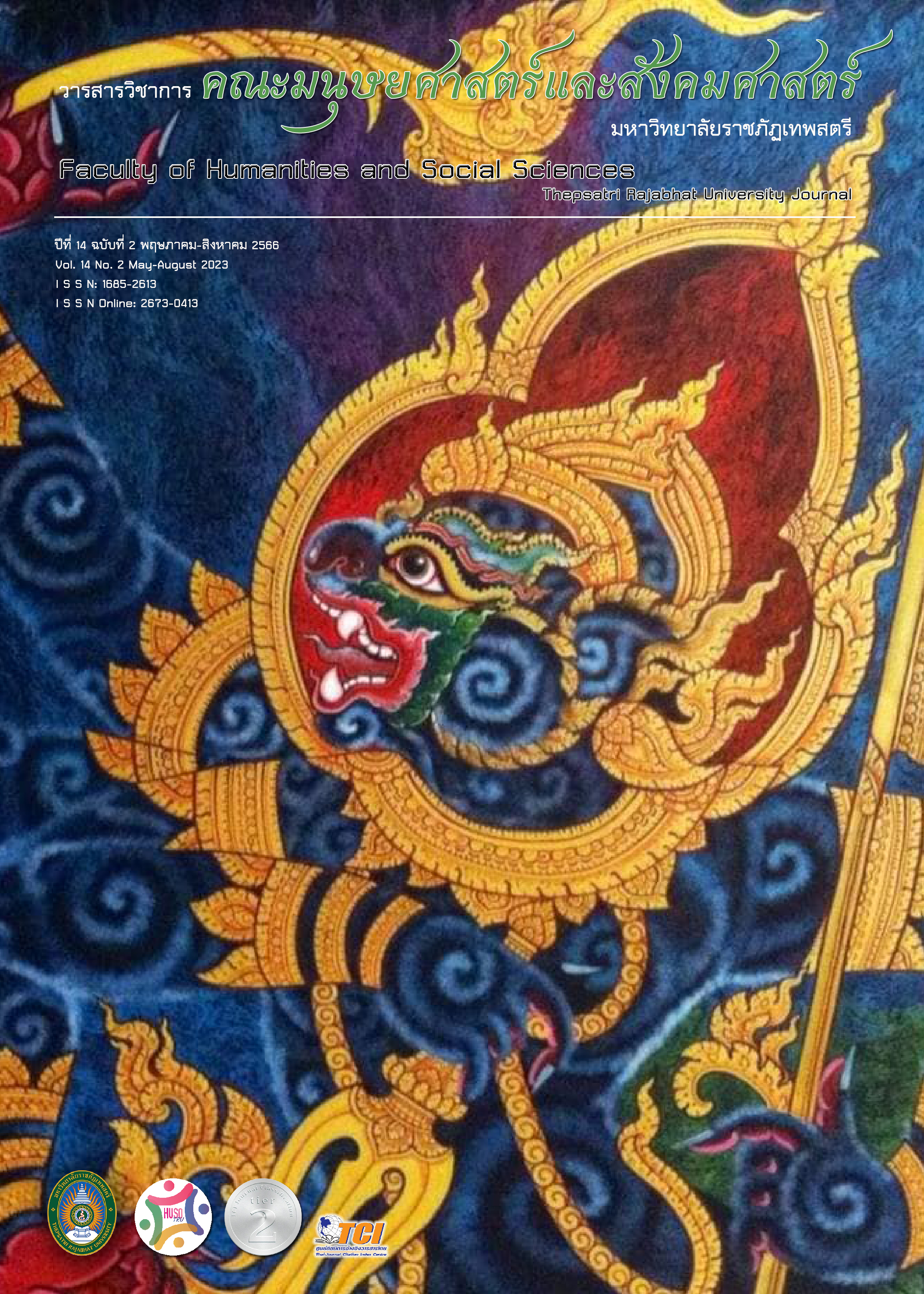นวัตกรรม “ขิงผง” การแปรรูปเพื่อเพิ่มมูลค่าของผลิตผลทางการเกษตร กับการพัฒนาชุมชนสู่ความมั่นคงทางอาหารจากการใช้ประโยชน์
Main Article Content
บทคัดย่อ
การศึกษาครั้งนี้มีวัตถุประสงค์เพื่อส่งเสริมการสร้างอาชีพและรายได้ให้กับชุมชนผ่านการนำผลผลิต (ขิง) ที่มีปริมาณมากมาแปรรูปในพื้นที่หมู่บ้านน้ำทบ ตำบลปลาบ่า อำเภอภูเรือ จังหวัดเลย และเพื่อส่งเสริมองค์ความรู้ในมิติของความมั่นคงทางอาหาร ด้านการใช้ประโยชน์จากผลิตผลทางการเกษตรในพื้นที่หมู่บ้านน้ำทบ ตำบลปลาบ่า อำเภอภูเรือ จังหวัดเลย กลุ่มตัวอย่างในการศึกษาครั้งนี้ ผู้วิจัยได้กำหนดกลุ่มตัวอย่างในการศึกษาวิจัย โดยการเลือกแบบเจาะจง (Purposive Sampling) จำนวน 70 ราย เก็บรวบรวมข้อมูลโดยการวิจัยเอกสาร การสังเกตและการระดมความคิดเห็น ผลการวิจัยพบว่า ปัจจุบันในเขตพื้นที่ภาคตะวันออกเฉียงเหนือตอนบน ยังคงมีการประกอบอาชีพด้านเกษตรกรรมเป็นหลัก โดยจะมีความเป็นไปที่สอดคล้องกับบริบทวิถีชีวิต ซึ่งการประกอบอาชีพด้านเกษตรกรรมที่ได้รับความนิยม นั้นก็คือ “การปลูกขิง” เกษตรกรร่วมกับภาควิชาการในพื้นที่จึงได้เล็งเห็นถึงการจัดการขิง โดยการแปรรูปเพื่อเพิ่มมูลค่าของขิงในรูปแบบขิงผง เพื่อเป็นแนวทางเสริมสร้างอาชีพและรายได้ให้กับชุมชนและตระหนักถึงความสำคัญของประเด็นความมั่นคงทางอาหาร ตลอดจนเป็นการนำผลผลิตที่ปริมาณมากมาสร้างรายได้จากการแปรรูป (นวัตกรรม) ขึ้นมา ภายใต้โครงการยกระดับเศรษฐกิจและสังคมรายตำบลแบบบูรณาการ (U2T) ของมหาวิทยาลัยราชภัฏเลย
Downloads
Article Details

อนุญาตภายใต้เงื่อนไข Creative Commons Attribution-NonCommercial-NoDerivatives 4.0 International License.
เนื้อหาและข้อมูลในบทความที่ตีพิมพ์ในวารสารวิชาการคณะมนุษยศาสตร์และสังคมศาสตร์ มหาวิทยาลัยราชภัฏเทพสตรี ถือเป็นข้อคิดเห็นและความรับผิดชอบของผู้เขียนบทความโดยตรง ซึ่งกองบรรณาธิการวารสารไม่จำเป็นต้องเห็นด้วย หรือร่วมรับผิดชอบใดๆ
บทความ ข้อมูล เนื้อหา รูปภาพ ที่ได้รับการตีพิมพ์ในวารสารวิชาการคณะมนุษยศาสตร์และสังคมศาสตร์ มหาวิทยาลัยราชภัฏเทพสตรี ถือเป็นลิขสิทธิ์ของวารสารวิชาการคณะมนุษยศาสตร์และสังคมศาสตร์ มหาวิทยาลัยราชภัฏเทพสตรี หากบุคคลหรือหน่วยงานใดต้องการนำทั้งหมดหรือส่วนหนึ่งส่วนใดไปเผยแพร่ต่าหรือกระทำการใดๆ จะต้องได้รับอนาญาตจากวารสารวิชาการ ฯ ก่อนเท่านั้น
เอกสารอ้างอิง
กิติศักดิ์ ทองมีทิพย์. (2563). พัฒนาการเกษตรกรรมของประเทศไทย: ในมิติด้านการพัฒนาชุมชนและคุณภาพชีวิต. วารสารพัฒนศาสตร์, 4(1), 62 - 132.
ธัญชนก ช้องทอง. (2561). การมีส่วนร่วมของเกษตรกรในโครงการ 9101 ตามรอยเท้าพ่อ ภายใต้ร่มพระบารมี เพื่อการพัฒนาการเกษตรอย่างยั่งยืน ในพื้นที่ตำบลน้ำพุ อำเภอบ้านนาสาร จังหวัดสุราษฎร์ธานี. วิทยานิพนธ์ปริญญามหาบัณฑิต มหาวิทยาลัยเกษตรศาสตร์.
นิเวศน์ เหมวชิรวรากร. (2558). การลงทุนที่ดีที่สุดสำหรับมนุษย์เงินเดือน. กรุงเทพฯ: ซีเอ็ดยูเคชั่น.
รุ่งโรจน์ จุกมงคล. (2555). เลย. กรุงเทพฯ: สารคดี.
วงศกร ตระกูลหิรัญผดุง. (2556, กรกฎาคม). การพัฒนาอย่างยั่งยืนกับการลงทุนอุตสาหกรรมไทย. วารสารวิชาการสมาคมส่งเสริมเทคโนโลยี (ไทย-ญี่ปุ่น), 189(22), 19 - 23.
วิรัลพัชร ประเสริฐศักดิ์. (2555). แนวคิดและคำนิยามของความมั่นคงทางอาหาร. มหาสารคาม: วิทยาลัยการเมืองการปกครอง โครงการผลิตตำราวิทยาลัยการเมืองการปกครอง มหาวิทยาลัยมหาสารคาม.
สุพรรณี ไชยอำพร. (2560, มกราคม - มีนาคม). ความมั่นคงทางอาหาร: สิ่งบ่งชี้ต่างวัฒนธรรมในสังคมไทย. วารสารพัฒนบริหารศาสตร์, 57(1), 200 - 223.
สุภางค์ จันทวานิช. (2549). วิธีการวิจัยเชิงคุณภาพ. กรุงเทพฯ: สำนักพิมพ์จุฬาลงกรณ์มหาวิทยาลัย.
สำนักงานเกษตรและสหกรณ์ จังหวัดเลย. (2562). ข้อมูลทั่วไปและข้อมูลด้านการเกษตร จังหวัดเลย ประจำปี 2562. เลย: กลุ่มสารสนเทศการเกษตร สำนักงานเกษตรและสหกรณ์ จังหวัดเลย.
สำนักงานเศรษฐกิจการเกษตร. (2565). ข้อมูลการผลิตสินค้าเกษตร. สำนักงานเศรษฐกิจการเกษตร กระทรวงเกษตรและสหกรณ์. สืบค้น กรกฎาคม 11, 2565, จาก https://www.oae.go.th.
สำนักงานสภาพัฒนาการเศรษฐกิจและสังคมแห่งชาติ. (2564). ประเทศไทยกับการพัฒนาอย่างยั่งยืน. สำนักนายกรัฐมนตรี. สืบค้น มีนาคม 5, 2565, จาก https://sdgs.nesdc.go.th/.
อภิชาติ พงษ์ศรีหดุลชัย. (2556). ความมั่นคงทางอาหารและพลังงานของไทย. กรุงเทพฯ: สถาบันระหว่างประเทศเพื่อการค้าและการพัฒนา.
Food and Agriculture Organization of the United Nations (FAO). (1996). Rome Declaration on World Food Security and World Food Summit Plan of Action. Retrieved April 22, 2022, from http://www.fao.org/wfs.
______. (2002). The State of Food Insecurity in the World. อ้างอิงจากเอกสารแนวคิดและคำนิยามของความมั่นคงทางอาหาร. สืบค้น กุมภาพันธ์ 11, 2565, จาก ftp://ftp.fao.org/docrep/fao/006/ j0083e/j0083e00.pdf.


